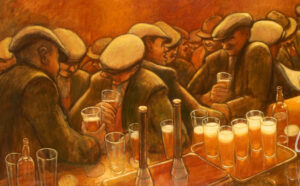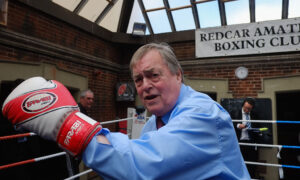“He’s top class and I’m bottom class,” recalled the late John Prescott of his time serving the drinks to Sir Anthony Eden as a steward on the MV Rangitata. On doctor’s orders, Eden and his wife had embarked on a cruise to New Zealand, a mere nine days after his post-Suez resignation in January 1957.
In later life, wags would joke that Prezza had once “worked for Cunard … and he still works pretty hard to this day”, but his early seafaring career connects us to an increasingly distant past, where a life at sea was still a fairly typical career choice for British young men with a taste for adventure.
During that six-week voyage, Eden had presented Prescott with bottles of beer for his prowess in the ship’s boxing ring, and Prescott would go on to describe Eden as an “old Tory gent” for his courtesy and good manners (although he was less keen on the snobbish Lady Eden). Yet the 18-year-old firebrand still considered the former Conservative Prime Minister a class enemy.
At sea, Prescott’s union bosses considered him a troublemaker, and a sense of social inadequacy gnawed at him throughout his life. This was sharpened by his educational experiences, first by failing the 11-plus (a source of trauma for so many of his generation); then the embarrassment of unacknowledged dyslexia during his time at Ruskin College; and when a middle class student at Hull University said he belonged to the “lumpen proletariat”, he only realised later that he’d been insulted.
His whole career was a sort of revenge for these humiliations, and the taunts in the Commons chamber from patricians such as Nicholas Soames — “mine’s a gin and tonic, Giovanni, and would you ask my friend what he’s having?” — left Prescott with a seething hatred of the Tories, and a steely commitment to ousting them from the government benches.
This is why Prescott and his one-time flatmate Dennis Skinner (another Ruskin alumnus) parted company; for Prescott’s hero was Ernie Bevin, Attlee’s hard-headed right-hand man. Thus, Prescott rallied to support John Smith over “one member, one vote” in 1993, and then backed Tony Blair over the demise of “Clause IV”, that explicitly socialist commitment to “the common ownership of the means of production, distribution and exchange”, that was perceived by party reformers as a drag on Labour’s electability. For just like Bevin, Prescott always wanted power.
But in the public imagination, his political skills were perhaps under-appreciated (although not by those who worked with him), and it was his human qualities that made him so attractive as a public figure. Yes, he mangled his words, “the green belt is a Labour achievement, and we mean to build on it”‘, or after a rough flight “it’s great to be back on terra cotta”, but that was part of his unrehearsed charm.
To some he was that recognisable type, the bolshie shop steward or the barrack-room lawyer with a combustible temper — but he was also a champagne socialist in the very best sense of “nothing being too good for the workers”. In the Seventies, the NUM leader Joe Gormley had said that he looked forward to a time when every miner “could afford a Rolls Royce in the driveway and a Mini for the wife to go shopping in”, although not many achieved that dream. So though Prescott may have been mocked for his “two Jags” and his enormous mock Tudor house on leafy Saltshouse Road in Hull, with its battlements and gargoyles (known locally as “Prescott Towers”), and for his junkets to the Maldives and croquet on the lawn at Dorneywood, he and his glamorous Liz Taylor-esque wife Pauline, blow-dried to within an inch of her life, lived out the aspirations of so many working class families. At a certain level, you just had to respect the hustle.
Although Oliver Cromwell may have been one of his political heroes, Prescott was no puritan — “never knowingly under-lunched” in the lingo of the Westminster lobby, and only the truly gifted could open their “clack” (as the throat is known in parts of the North) and neck a pint in under five seconds like Prescott could. He had an authenticity, too, and so many of the tributes to him since his death have noted his kindness and consideration, especially to ordinary people, or how he spoke up for those overlooked places in the North unvisited by prosperity.
Here was a man who could literally walk with kings and never lose the common touch — although the future Charles III was perturbed by his habit in meetings with him of sliding down the seat with his legs apart “his crotch pointing a little menacingly” and balancing his teacup and saucer on his paunch.
It’s depressing that an unabashed working-class figure like Prescott is still treated as a curiosity and a stage Northerner, and says a lot about how little has changed since he entered politics. When he first stood for the deputy leadership of the Labour party, in 1988, around a third of Labour MPs came from working-class jobs, but the proportion has now dropped to just 13%. Little wonder so many politicians struggle to connect with the electorate, as Prezza did so literally.
Throughout the Labour Party’s history, the middle-class and working-class elements of what is still cringingly referred to at moments like these as the Labour movement, were held together in an uneasy alliance. The Labour historian Kenneth O. Morgan noted that although the party was “mostly led by middle class professionals, from the Webbs to the Blairs, [Prescott] was the token proletarian on Labour’s front bench in the grand old tradition of Jimmy Thomas, Ernie Bevin, and George Brown” – and, latterly, we might add, Angela Rayner.
But, ironically, Prescott’s hard-headed devotion to the New Labour project led directly to the final victory of the bourgeois strain in Labour, and the complete dominance of a New Establishment — drawn from the hauts-fonctionnaires of the BBC, universities and public sector — who can be just as snooty and out of touch as the Old Establishment that he first encountered on the deck of the Rangitata.
Disclaimer
Some of the posts we share are controversial and we do not necessarily agree with them in the whole extend. Sometimes we agree with the content or part of it but we do not agree with the narration or language. Nevertheless we find them somehow interesting, valuable and/or informative or we share them, because we strongly believe in freedom of speech, free press and journalism. We strongly encourage you to have a critical approach to all the content, do your own research and analysis to build your own opinion.
We would be glad to have your feedback.
Source: UnHerd Read the original article here: https://unherd.com/



